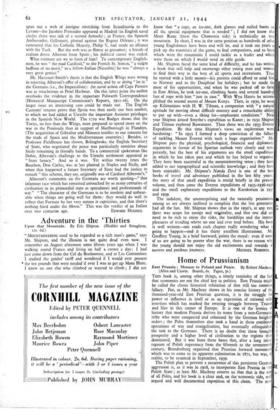Adventure in the 'Thirties
" MOUNTAINEERING used to be regarded as a rich man's game," says Mr. Shipton, and the illusion is not quite dead even now. I remember an August afternoon some fifteen years ago when I was walking round France and living on half a crown a day: I had just come down from the'Col du Bonhomme, and at Les Contamines I studied the guides' tariff and wondered if I would ever possess • the ten pounds that were needed if ever I was to get up Mont Blanc. I knew no one else who climbed or wanted to climb ; I did not know that " a rope, an ice-axe, dark glasses and nailed boots are all the special equipment that is needed " ; I did not know tha Mont Banc (from the Chamonix side) is technically an easy mountain. In short, I was in the same position as hundreds of other young Englishmen have been and will be, and it took me yeats to pick up the essentials of the game, to find companions, and to learn which were the mountains I could tackle as a leader' and which were those on which I would =teed an able guide.
Mr. Shipton faced the same kind of difficulty, and he has written a book that will help and encourage other young men and women to find their way to the best of all sports and recreations. True, he started with a little money—his parents could afford to send hint to Norway and to the Dauphine for holidays ; but he made the most of his opportunities, and when he was packed off to lane in East Africa, he took ice-axe, climbing boots and several hundred feet of rope with him " just in case." With Wyn Harris he accom, plished the second ascent of Mount Kenya. Then, in 193o, he went up Kilimanjaro with H. W. Tilman, a companion with " a natural aptitude for moving about difficult country and a remarkable ability to put up with—even a liking for—unpleasant conditions." Neat year Shipton joined Smythe's expedition to Kanet ; in 1932 Shipton and Tilman explored Ruwenzori. Then there was the 1933 Everest Expedition. By this time Shipton's views on exploration were hardening : " In 1933 I formed a deep conviction of the fallacy of tackling Mount Everest with such a huge organisation." Mr Shipton puts the physical, psychological, financial and diplomatic arguments in favour of his Spartan outlook very clearly and tem- perately, but the best of his arguments are the small expeditions in which he has taken part and which he has helped to organise. They have been successful in the mountaineering sense ; they have added to our topographical and scientific knowledge ; and they have been enjoyable. Mr. Shipton's Nanda Devi is one of the best books of travel and adventure published in the last fifty years ; the story of that small expedition is retold briefly in the present volume, and then came the Everest expeditions of 1935-1936-1938 and the small exploratory expeditions to the Karakorum in 1937 and 1939.
The indolent, the unenterprising and the naturally pessimistic
among us are always inclined to complain that the last generation had all the fun. Mr. Shipton shows that in the 1930's, at any rate: there was scope for energy and originality, and that one did not
need to be rich to enjoy the risks, the hardships and the intense pleasures of treading where no one had ever trod before. His book is well written—one reads each. chapter really wondering what is
going to happen—and- it has thirty excellent illustrations. Mr Geoffrey Young, in a brief foreword, points the moral: even if sonic of us are going to be poorer after the war, there is no reason why the young should not enjoy the old excitements and rewards of


























 Previous page
Previous page